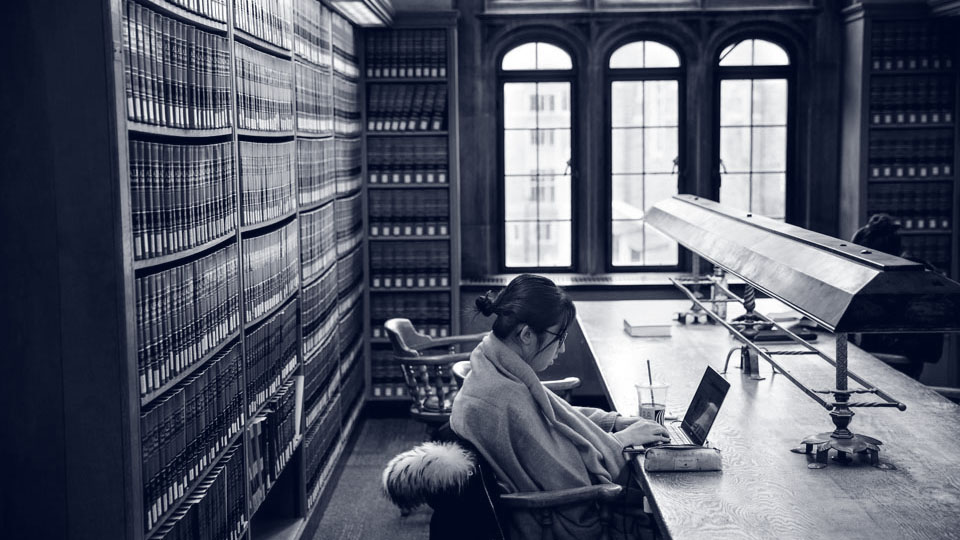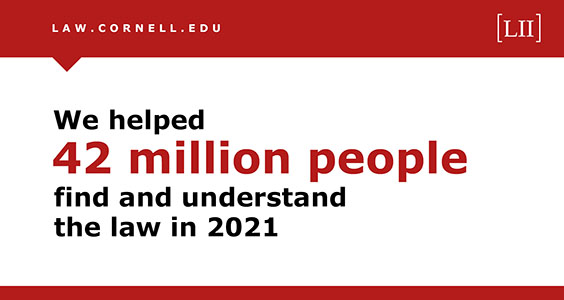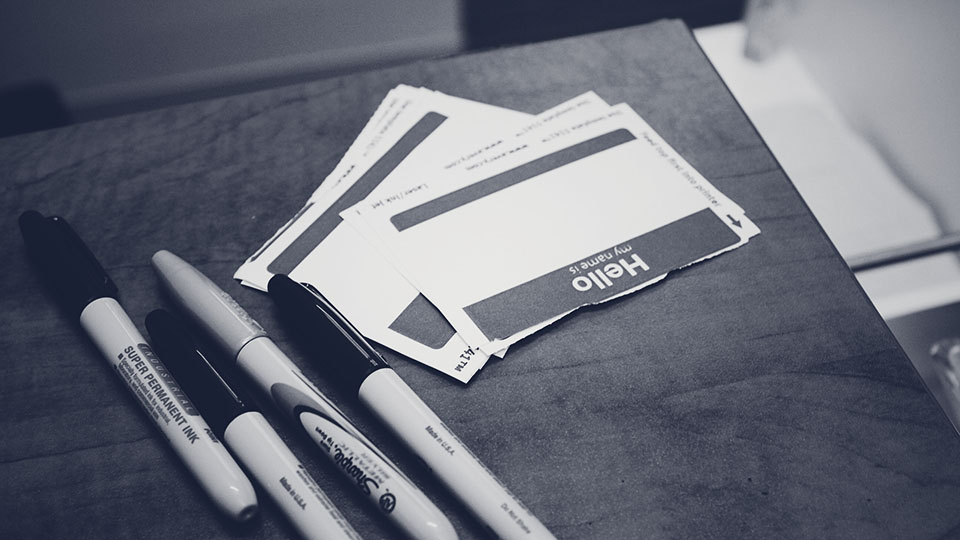Annual Report 2022
Impacts
Traffic
LII is reaching more people than ever. In Fiscal ‘22, 45 million people visited the website, engaging in 74 million sessions and viewing 177 million pages of content. Though delighted, we were frankly a bit surprised. If you read our FY21 annual report, you’d have seen an acknowledgment of the Cornell Chronicle article on the traffic spikes we experienced around the major events of 2020-21 (Covid, Black Lives Matter protests, and January 6th insurrection). And if you’d asked us to make a prediction, we’d have expected traffic to decrease. Even though it was clear that the U.S. Supreme Court was headed for controversy, the coverage from the Court’s own website, along with news outlets, blogs, and, for any given issue, advocacy organizations with deep subject matter coverage typically keeps our own traffic to Court-related content at a relatively steady level.
Yet, LII sustained a traffic spike on decision day for Dobbs v. Jackson Women’s Health Organization that was roughly equivalent to the traffic level of January 6, 2021. Our copies of Roe v. Wade, Planned Parenthood of Southeastern Pennsylvania v. Casey, the U.S. Constitution Annotated on abortion, and LII’s Wex article on privacy trended alongside Dobbs itself. For the weekend that began with the release of Dobbs v. Jackson Women’s Health Organization on Friday, June 24, more than 1.1 million people came to the website and viewed almost 2 million pages of content. (That is 270% more visitors and 130% more pages viewed than during the same weekend in 2021.)
Surrounding this large traffic spike were smaller trends — often showcasing the work of Cornell Law students: the LII Supreme Court Bulletin preview for West Virginia v. EPA began trending on June 23rd, bringing the total pageviews for the fiscal year above 14,000 after fewer than 200 at the time of initial publication. The Wex article on separation of church and state (updated by the students on the Wex Definitions Team in the spring of 2021) trended alongside Kennedy v. Bremerton School District when it was decided on June 27th. And the preview of New York State Rifle & Pistol Association Inc. v. Bruen received over 1000 pageviews on decision day, finishing the term with over 27,000 hits. Perhaps most impressively, LII Supreme Court Bulletin previews received an average of over 22 minutes of users’ attention — many times the average time on page for the vast majority of LII content.
Who entrusts us with their readers
We are proud to say that nonprofit organizations, educational institutions, news outlets, and all levels of government continued to extend their vote of confidence in our resources by sending us their readers. In the past year, we received referrals from the Small Business Administration, the Texas Workforce Commission, and the government of Massachusetts. The American Bar Association, iCivics, and the Tenant Resource Center all sent us traffic. We received referrals from learning management platforms like Google Classroom and universities across the United States. Although we’ve yet to top the January 6th related peaks in links from news articles, we received referrals from news outlets including the Washington Post, NPR, CNN and Fox News.
Global reach
Beyond the United States, LII served more than 9.4 million readers across the world in 242 countries and territories. Although the composition of the top countries by traffic is remarkably stable year over year, the rankings shifted a bit: this year, China increased its traffic by better than 58%, rising above Canada and the UK to reach #4 (behind India and the Philippines). Nigeria captured the #10 slot, and North Korea registered visitors for a second year, though this time only two readers instead of three.
But the traffic report only goes so far. We rely—flourish, really—on feedback from our readers, most of whom use LII for their work, but whose work varies quite broadly. This year, we were grateful to hear from so many who were willing to let us share their testimonials:
An indispensable source for scholars who are not lawyers.
John M. Abowd, Edmund Ezra Day Professor Emeritus of Economics, Statistics and Data Science at Cornell University
I’ve long relied on LII working for a tiny federal agency without a large budget. Over the past year, I found myself using it with my child to help with remote learning. Thank you!
Dorothy Avery
A retired lawyer with experience in a wide range of specializations, I still do considerable pro bono legal work. Now on a fixed income I can do so in part because you make that so much easier. Keep up the great work.
Kathleen F. O’Reilly
Thank you so much. I point my students in college to your site as reliable info. YAY!
Stella H.
Legal resources provided by LII have aided me in law enforcement for more than 25 years. I greatly appreciate the service.
Steven Douglas
Whenever I have needed to find administrative law filings by the Federal Communications Commission affecting the amateur radio service and other wireless services that were difficult to find elsewhere, the excellent indexing of the Legal Information Institute has always provided me that for which I had sought.
Brent L Carruth, PhD
Invaluable resource for people who don’t subscribe to pricey legal search engines.
Mark Weston
I use your site regularly to review historic Supreme Court cases regarding the Constitution, to properly understand the Oath I swore when accepting my commission. Thank you for a resource an engineer can understand.
Douglas M.
I have used this resource for 20 years. Thank you!
Chrysti Gilbreth
Thank you for your invaluable service! You enhance Cornell’s reputation.
Rosemary Pye, JD ’74
Wex
Fiscal ‘22 saw clear results from the emphasis we have placed in recent years on improving Wex, our collection of original, straightforward explanations of legal terms and concepts. Our students have now revised or created more than 4,000 Wex entries since this renovation initiative began in 2020. As a direct result, the public is finding Wex in much higher numbers than ever before. Wex usage in Fiscal ‘22 jumped over 40%, from a little more than 16 million pageviews in FY21 to almost 23 million in FY22. The most popular Wex pages over the last fiscal year were articles explaining the Second, Fifth, and First Amendments to the US Constitution, followed by the definitions of “contract,” “federalism,” “due process,” and “defamation,” as well as our summary of the 1973 Roe v. Wade opinion.
Supreme Court Bulletin
As always, the thirty-six students who research, draft, and edit our Supreme Court Bulletin Previews provided the public with important analysis of the arguments made by the parties in every case that court heard. Unsurprisingly, the highest-profile cases yielded the most pageviews, with tens of thousands of people reading our students’ explanations of New York State Rifle and Pistol Association v. Bruen, Dobbs v. Jackson Women’s Health Organization, and West Virginia v. EPA, along with others from the term such as Carson v. Makin and Kennedy v. Bremerton School District. We want to acknowledge the many Law School faculty who assist our students in understanding these cases as they do their research and writing.
The other half of our Bulletin service, where we immediately publish and circulate to subscribers all Supreme Court opinions from a direct feed from the court’s administrators, was also busy in Fiscal 22. Our collection of US Supreme Court opinions saw 40% more traffic during Fiscal 22 than in Fiscal 21. As an interesting insight into how many news services now publish new opinions, as well as the progress the Supreme Court itself has made in publishing its own output, it’s worth noting that our most viewed opinion of FY22–with more than a million unique pageviews–was Roe v. Wade, which returned to the spotlight for obvious reasons.
Women and Justice Collection
Our Women & Justice Collection at the Legal Information Institute provides open access to legal resources related to gender justice from around the world. The first vetted and searchable database of its kind, the Collection hosts domestic, regional, and international caselaw, legislation, and other legal instruments. Each resource is accompanied by a plain-language, one-paragraph summary to help ensure that everyone can understand the laws that govern them. Student researchers edit summaries provided by pro bono law firm associates from White & Case and Gibson, Dunn & Crutcher; translate summaries; and perform comparative law research for the Collection’s NGO partners. NGO partners include the Democratic Governance & Rights Unit (DGRU) at the University of Cape Town and Cornell’s Death Penalty Worldwide. A representative research project from FY22 summarized evidence laws of 12 southern African countries (Botswana, Eswatini, Kenya, Lesotho, Malawi, Mauritius, Namibia, South Africa, Tanzania, Uganda, Zambia, Zimbabwe) for local bench guides for the Judicial Institute for Africa at the DGRU.
State regulations
Our new state regulations collection, made possible by Public.Resource.Org’s multi-year Code Improvement Commission project, continues with the collaboration of LII, Fastcase, Inc., Justia, Inc., and others. In the past year, we revamped the collection to take advantage of a new, more consistent raw data source. We refined our tools for ingesting, processing, standardizing, enriching, and publishing the regulations of the 50 states in a user-friendly and accessible format, while maintaining access and timely updates for an audience that grew from just a half-million pageviews in FY21 to more than 4 million in FY22. Most importantly for our effort to improve the discoverability and readability of the regulations, we worked with two teams of M.Eng. students to analyze and mine the text of the regulations for legally significant features (e.g., definitions) that are not marked up explicitly in the text. These applied research projects both leverage what we have learned from our prior work with federal regulations and enable us to take in a much broader range of drafting conventions among the many agencies across the 50 states. We look forward to bringing the resulting features to the public on the LII website over the next year.
Collaboration
LII staff members continued to serve as a resource to the free access to law movement and legal technology projects, collaborating with a number of groups in government, non-profits, and industry—including the Government Publishing Office, the Center for Computer Aided Legal Instruction, and a range of startup companies. We continued to serve as a formal advisor to the National Science Foundation-funded project FAI: Using AI to Increase Fairness by Improving Access to Justice, and two of our technologists with experience in legal informatics research joined the FAI research team, exploring techniques and providing feedback on evaluation. We also maintained representation on the editorial boards of two journals: the Journal of Open Access to Law, and Law in Context, which “publishes socio-legal articles that explore the social, historical, economic, political, and technological aspects of the operation of law”.
Finances
Though a part of Cornell Law School, LII receives no direct funding from Cornell and is entirely self-funded. As always, none of this would be possible without support from friends like you. As we are fond of saying: we would be irrelevant without real people using the information we publish to solve real problems, and we would be impossible without your generous financial support each year. Thank you again this year for your support of LII.











